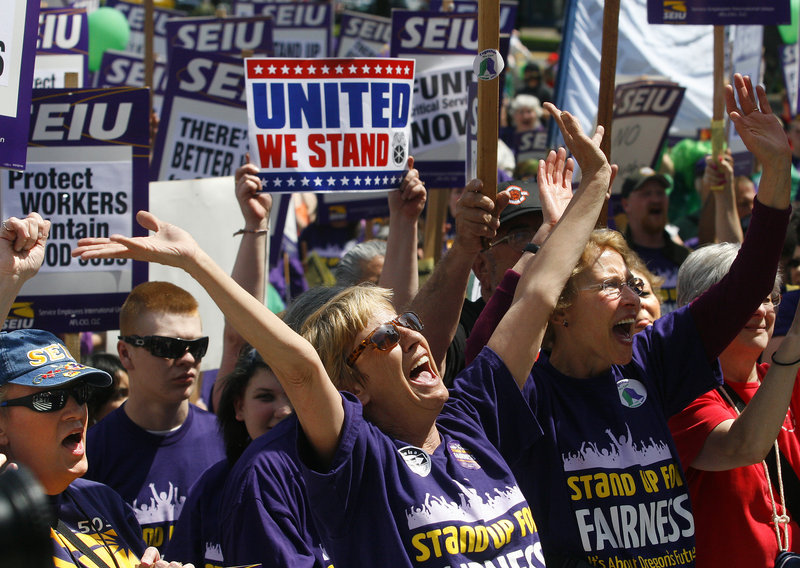SACRAMENTO, Calif. – Pushed to the margins of the U.S. economy, labor unions are engaged in an epic struggle to preserve their members’ wages and benefits.
For the most part, they’re losing.
Union members across America still enjoy higher pay on average than their nonunion counterparts, but the gap is shrinking. Organized labor is under persistent pressure to make concessions. Diminishing membership also has eroded union power.
The United Auto Workers gave ailing Detroit automakers $1 billion in cuts. Pilots at American Airlines learned last month their pay and benefits could get reduced substantially. Even California’s powerful public employee unions have given ground in recent years.
And in the biggest labor battle the Sacramento region has seen in years, northern California’s three union supermarket chains — Raley’s, Safeway and Save Mart — are pushing for concessions on health care and other issues, arguing they need to cut labor costs to compete against Wal-Mart and other nonunion stores.
The situation hit the boiling point this week with Raley’s. The West Sacramento grocer ended negotiations and vowed to submit its “last, best and final contract offer” to the United Food and Commercial Workers, or UFCW.
Raley’s offered to meet under federal mediation. But on Friday, Jacques Loveall of the UFCW said he will schedule a strike vote in response to Raley’s “erratic bargaining position.” Loveall also issued a statement through a spokeswoman suggesting the union wouldn’t resume negotiations until Raley’s agrees to extend the workers’ current contract.
In reality, both sides are vulnerable, and both have reason to fear a confrontation, said Ken Jacobs, chairman of the Center for Labor Research and Education at the University of California-Berkeley.
Raley’s is already struggling, and “a strike could be devastating,” Jacobs said. Neither can the union afford “to push Raley’s off a cliff” by striking, Jacobs said, since that could ultimately cost workers their jobs.
Few unions are immune to the pressure to accept concessions, particularly in a difficult economy. That’s true even for public employees, a remaining stronghold for union membership.
California’s public employees, who have considerable influence over Democratic elected officials, have escaped wholesale benefit cuts sought by Republicans. But they have compromised on issues such as overtime pay, employee contributions to pensions and paid holidays. And their ranks have been thinned, especially at the local level, by layoffs.
Concessions have been steeper in the private sector, where competition is fierce, firms are struggling and nonunion alternatives abound.
For instance, the UAW in 2009 suspended dental care, agreed to cutbacks in drug coverage and made other concessions to help keep U.S. automakers from going under. The concessions, totaling $1 billion, were made as part of the federal bailout of the industry.
Even in a growing field such as telecommunications, cost pressures can be relentless.
Verizon workers went on strike last summer rather than swallow $1 billion in concessions. They went back to work after two weeks even though the contract remains unsettled.
It becomes hard for unions to protect wages in “industries that have alternatives, where you have companies with lower prices,” said David Smith, a labor economist at Pepperdine University.
Smith said union workers make about 15 percent more, on average, than nonunion counterparts in the same occupations. The gap is considerably higher in some industries, such as construction, according to federal data.
Send questions/comments to the editors.



Success. Please wait for the page to reload. If the page does not reload within 5 seconds, please refresh the page.
Enter your email and password to access comments.
Hi, to comment on stories you must . This profile is in addition to your subscription and website login.
Already have a commenting profile? .
Invalid username/password.
Please check your email to confirm and complete your registration.
Only subscribers are eligible to post comments. Please subscribe or login first for digital access. Here’s why.
Use the form below to reset your password. When you've submitted your account email, we will send an email with a reset code.